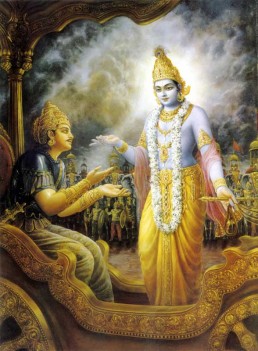Swami Chinmayananda
Swami Chinmayananda Commentary
Every action does not bring about bondages upon the doer. It is only unintelligent activities that thicken the impressions in the mind, and thus successfully build a thick and impenetrable wall between the ego-centre and the unlimited Divine-Spark-of-Life in us. Every action motivated by ego-centric desires thickens the veil and permits not even a single ray of the essential Divinity to peep through it, to illumine the life in us. According to the traditional translation, all activities other than the Yajna-activities will bring about vasana-bondages, and the individual’s ultimate development and growth will be arrested. Yajna here means only “any self-sacrificing work, undertaken in a spirit of self-dedication, for the blessing of all.” Such an action cannot be self-degrading and, therefore, it is self-liberating. The following stanzas also will become more and more clear, and universally appropriate in their meaning, only when we understand Yajna as “any social, communal, national, or personal activity into which the individual is ready to pour himself forth entirely in a spirit of service and dedication.”
Only when people come forward to act in a spirit of co-operation and self-dedication, can the community get itself freed from its shackles of poverty and sorrow. This is a fact endorsed by history. And such activities can be undertaken in a spirit of Divine loyalty, only when the worker has no attachment. Arjuna’s defect was that he got too attached to the individuals in the opposing forces, and he developed, consequently, wrong relationships with them. Therefore, he came to feel that he must run away from the field of work that had presented itself before him.
FOR THE FOLLOWING REASONS ALSO, ACTION SHOULD BE DONE BY HIM, WHO IS QUALIFIED FOR IT:
Adi Sankara Commentary
Ayam, this; lokah, man, the one who is eligible for action; karma-bandhanah, becomes bound by actions- the person who has karma as his bondage (bandhana) is karma-bandhanah-; anyatra, other than; that karmanah, action; yajnarthat, meant for Got not by that meant for God. According to the Vedic text, ‘Sacrifice is verily Visnu’ (Tai. Sam. 1.7.4), yajnah means God; whatever is done for Him is yajnartham. Therefore, mukta-sangah, without being attached, being free from attachment to the results of actions; O son of Kunti, samacara, you perform; karma, actions; tadartham, for Him, for God. An eligible person should engage in work for the following reason also:
The Bhagavad Gita with the commentary of Sri Sankaracharya – Translated by Alladi Mahadeva Sastry
Holy Geeta – Commentary by Swami Chinmayananda
The Bhagavad Gita by Eknath Easwaran – Best selling translation of the Bhagavad Gita
The Bhagavad Gita – Translation and Commentary by Swami Sivananda
Bhagavad Gita – Translation and Commentary by Bhaktivedanta Swami Prabupadha
Srimad Bhagavad Gita Chapter 3 – Verse 9 – 3.9 yajnarthat karmano – All Bhagavad Gita (Geeta) Verses in Sanskrit, English, Transliteration, Word Meaning, Translation, Audio, Shankara Bhashya, Adi Sankaracharya Commentary and Links to Videos by Swami Chinmayananda and others – 3-9

